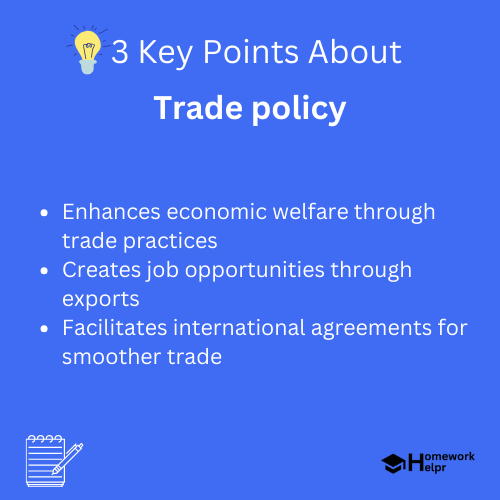📝 Summary
Trade policy encompasses the regulations and agreements that manage the exchange of goods and services internationally, significantly impacting a nation’s economy. Its primary goal is to enhance economic welfare through efficient trade practices. Trade policies can be protectionist, shielding domestic industries, or liberalizing, promoting international trade. Key points include its importance for economic growth, job creation, and increased consumer choice, with various types like tariffs, quotas, and subsidies. Understanding trade policy is vital for informed economic decisions and navigating modern trade challenges.
Understanding Trade Policy
Trade policy refers to the regulations and agreements that govern the exchange of goods and services between countries. It plays a crucial role in shaping a nation’s economy, influencing everything from the price of everyday goods to the level of economic growth. The core objective of trade policy is to enhance a nation’s economic welfare through efficient trade practices.
Trade policies can be broadly categorized into protectionist measures and liberalization efforts. Protectionist measures are designed to shield domestic industries from foreign competition, while liberalization encourages international trading by reducing tariffs and removing other barriers. This article will delve deeper into the various aspects of trade policy, its significance, types, and implications.
The Importance of Trade Policy
Trade policy is vital for several reasons:
- Economic Growth: A well-designed trade policy can stimulate economic growth by opening new markets for domestic producers.
- Employment Opportunities: By facilitating exports, trade policy can help create jobs in various sectors.
- Consumer Choice: International trade increases the variety of products available to consumers, often at lower prices.
- Innovation: Exposure to global markets encourages innovation as companies strive to improve their products and services.
Due to these reasons, governments often spend considerable time and resources designing trade policies that reflect their national interests and economic strategies.
Types of Trade Policies
Trade policies can be classified into several categories based on their objectives and mechanisms. The major types include:
- Tariffs: These are taxes imposed on imported goods, making them more expensive and thereby protecting domestic industries.
- Quotas: Quotas limit the quantity of a certain good that can be imported, helping to maintain a balance between domestic production and imports.
- Subsidies: Governments may provide financial support to local industries, helping them compete against foreign imports.
- Trade Agreements: Bilateral or multilateral agreements between countries facilitate smoother trade operations and often include guidelines on tariffs and quotas.

Each of these policies carries implications for both domestic and foreign markets. For example, while tariffs can help local businesses, they may lead to higher prices for consumers. Similarly, subsidies may support local industries but could distort fair competition.
The Role of International Organizations
Several international organizations, such as the World Trade Organization (WTO), the International Monetary Fund (IMF), and regional bodies like the European Union (EU), play significant roles in shaping trade policies. They provide frameworks for trade negotiations and dispute resolution while promoting fair trade practices globally.
For instance, the WTO helps member countries settle trade disputes that arise from disagreements over trade policies, ensuring that the rules of international trade are maintained.
Definition
Dispute Resolution: A mechanism by which countries resolve conflicts regarding trade agreements or policies to maintain trade relations.
Impact of Trade Policy on the Economy
The impact of trade policy on a nation’s economy can be profound. A liberal trade policy can boost a country’s export potential, enhancing economic productivity and efficiency. However, protectionist policies can lead to unintended consequences:
- Trade Wars: When countries impose tariffs on each other, it can lead to escalating trade wars, adversely affecting global trade.
- Inflation: Higher imported goods due to tariffs can lead to rising prices overall, impacting everyday consumers.
- Global Supply Chains: In a globalized world, trade policies affect not just the importing and exporting countries but also nations indirectly involved in supply chains.
❓Did You Know?
Did you know? The first known trade policy dates back to around 1794 when the United States signed the Jay Treaty with Great Britain, which aimed to resolve various contentious issues following the American Revolution.
Modern Trade Challenges
In today‚’ globalized economy, trade policy faces several challenges:
- Technological Change: Rapid advancements lead to the creation of new products and services, which require modernized trade regulations.
- Environmental Issues: Trade policies must balance economic growth with sustainable practices, addressing concerns such as carbon emissions and resource depletion.
- Global Health Crises: The COVID-19 pandemic has prompted countries to reconsider supply chain dependencies and national stockpiling of essential goods.
As these challenges emerge, nations must adapt their trade policies accordingly to maintain competitive advantages and foster economic resilience.
Conclusion
Trade policy is a complex and vital aspect of economic strategy that influences not just the wealth of nations but the everyday lives of individuals. Understanding its various forms and implications helps students grasp the interconnectedness of the global market.
As future leaders and consumers, being informed about trade policies will empower young people to make better decisions regarding economic advocacy and consumer choices. With the right policies, countries can foster environments that favor healthy competition, innovation, and sustainable growth.
In summary, trade policy requires careful consideration and adjustment to align national interests with global realities. With the ongoing changes in our world, staying informed about trade policies will be essential for future success.
Related Questions on Trade policy
What is trade policy?
Answer: It refers to regulations governing international trade.
What are the types of trade policies?
Answer: Tariffs, quotas, and subsidies are key types.
Why is trade policy important?
Answer: It stimulates economic growth and innovation.
How do international organizations influence trade policy?
Answer: They facilitate trade negotiations and dispute resolutions.
